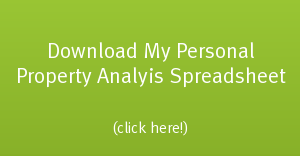Today I am honored to have my favorite real estate investor and property manager in the entire world write for me… my wife! Heather has been my constant companion on my journey through real estate investing and the reason for my success so far. She is not only the best property manager I have ever known, but she knows the business of real estate investing inside and out and has a heart to help others as well.
As someone who entered the world of landlording at the ripe young age of 23, I have had my fair share of dealing with tenants who take one look at me, and use that as ammunition they tuck away for later use when they need someone to walk all over. Sometimes, it’s written all over their face:
- Inexperienced
- Soft
- Easy
- Pushover
Great first impression, isn’t it? This is why over the last few years, I have developed a system that not only works for the fresh-faced beginner-landlord, but should be implemented by any and all landlords wishing to have a successful business relationship with their tenants.
It Starts with Being Knowledgeable.
The best ways to do this? Read. A lot. There are so many wonderful books out there on landlording that offer great ideas, strategies, and tools you can use in all sorts of situations you might suddenly find yourself in. I have three favorite books that I believe every landlord should read, highlighter in hand, at least at some point in their career:
“Landlording on AutoPilot” by Mike Butler
“The Unofficial Guide to Managing Rental Property” by Melissa Prandi
“How to Manage Residential Property for Maximum Cash Flow and Resale Value” by John T. Reed
Become familiar with your state’s landlord/tenant laws. I have my Landlord Tenant Act printed and tucked away nicely in a file for quick reference.
Also, the internet has a plethora of information from landlords of all shapes and sizes. The information and perspectives from BiggerPockets.com alone is enough to satisfy anyone looking for landlording advice.
Get together with other landlords. If there is one thing I’ve learned, landlords love talking about their experiences. Listen and learn!
The point is, don’t go through landlording blindfolded. Know what you’re getting yourself into, and have a solid foundation on which to build upon.
Have a Written Policy.
All that knowledge you learned? Personalize it to fit your business model and write it down. Cover everything. When a tenant has a question, instead of the answer coming from you, the landlord, it comes from the policy. Example: “My boyfriend got me a puppy for my birthday, can I keep it?” Answer: “I’m really sorry, but our policy states that no pets are allowed at that property.” Having the policy written down helps protect you from succumbing to your sensitive side that thinks on the spur of the moment, “Maybe just ONE puppy wouldn’t be so bad.”
Nope, it’s bad.
Your policy is there to protect you from yourself 🙂 Also, be sure to:
- Be Up Front. Once you have your policy in place, don’t be coy, make sure your tenants know what those policies are. They should be in your Rental Agreement or Lease, which your tenants should have a copy of.
- Be Consistent. The Rental Agreement I use with my tenants states that rent is due on the first and considered late after the fifth. On the sixth, if rent hasn’t been received, the tenant gets a $50.00 late fee and a 3-Day Pay or Vacate Notice per our policy and the terms in their Rental Agreement . The tenant is made aware of this when they move in, so it comes as no surprise when on the sixth they receive a late notice. When you are consistent, you are training your tenants to do things on your terms, which if you ask me, is a much wiser decision than doing things on theirs.
Follow Through.
This includes everything from completing tenant requested maintenance to enforcing your policies.
We once had a tenant in one of our 2-bedroom apartments that decided to get a young lab. Their Rental Agreement and our policy both stated that no pets were allowed on the premises. As soon as I was made aware of dog in the apartment (it’s difficult to hide a 60-pound dog in a 24-unit apartment complex!), I contacted the tenant by phone and reminded them of the strict “no-pet” policy and gave them a date by which the dog would have to be gone. When that date rolled around and the dog was still residing in the apartment, the tenant was given a 10-Day Notice to Comply with their Rental Agreement or immediately vacate the premises. On the tenth day, we did a thorough walk-thru of the home and confirmed the dog had been re-located.
Now, I wonder what would have happened if we hadn’t followed through? I can tell you: that apartment would still have one fluffy, yellow, 60-pound tenant.
Be Professional.
Landlording is a business, and as with any successful business, it’s important to always be on your best behavior. This includes the way you interact with your tenants, your appearance, written correspondence, returning phone calls promptly, etc. If you’ve been in the landlord role for any time at all, I’m sure you found out quickly that tenants can be the exact opposite. You can’t control them though, you can only control you. Set the precedent for your tenants that you are a professional business.
When my husband and I started out we essentially started our own property management company for our own rentals. We have a professional name, separate phone-line, operating hours (10-4 Monday thru Friday, with an emergency number for after-hours maintenance issues that can’t wait), logo, letterhead, standard forms, policies, maintenance crew, signs, etc. We answer the telephone with, “Thank you for calling (Company Name).” By doing this, it gave us the professional face we were looking for, and bonus, instantly gave us a higher authority to refer to.
Obviously not everyone needs to go so far as creating a company to run their business through, but the point is that you control how you appear to your tenants, and that appearance sets the precedent. If you want to be taken seriously, be professional in all situations, even when they’re not.
Offer a Quality Product.
Don’t be a slumlord. This doesn’t mean your rental has to look like it came straight out of Better Homes and Gardens, but give your tenants a clean home, something they can feel good in and show off to their friends. Also, generally the better product you offer, the better quality tenants you attract, and the better they will care of it while it’s in their possession.
Be Above Reproach.
Act with integrity. Don’t give your tenants a valid reason to complain.
Notice I said valid. Tenants complain, because unfortunately, in the tenants mind the landlord is the big, bad, rich guy taking advantage of everyone and their grandmother. But that doesn’t mean you have to be the stereotypical landlord. Do what you say you are going to do, when you say you’re going to do it. If your tenants have something to hold over you, trust me they will. So, why give them the opportunity? Doing this won’t stop the complaining or the stereotype, but you will always be one step ahead.
Final Thoughts
Obviously, these steps aren’t the magic formula for creating and maintaining a successful landlording career; however, they do set you up to have a tough time avoiding it. Simply know what you’re about, have a plan, and follow that plan. Whether you’re a beginner or seasoned, young or…wise (wink!), set yourself up to not only succeed, but exceed in this business.
P.S. looking for hard money loans in California? Be sure to check out my friends over at northcoastfinancialinc.com. They have very competitive rates, can fund within a week and specialize in fix and flip loans and other hard money loans.
 If this is your first time here at Real Estate In Your Twenties.com - welcome!
If this is your first time here at Real Estate In Your Twenties.com - welcome! 





